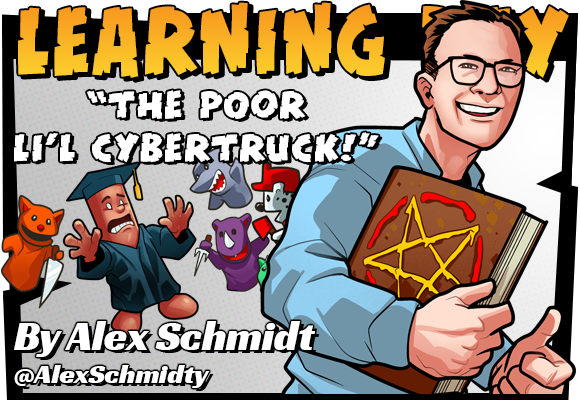
The Tesla Cybertruck: wait, stop, where are you going. Come back. I applaud your blanket aversion to CyberTruck HorseHockey. But look at this thing I found:

The Ugly Truckling: The Story Of My Cybertruck is a children’s book. It’s a children’s book about the Cybertruck, and the difficulties faced by poor helpless Cybertruck owners. The premise is that Cybertruck owners are demonized, because the Cybertruck is shaped different from other trucks. Society’s superficial cruelty attacks the Cybertruck, like The Ugly Duckling before it.
You may think the discourse around Cybertrucks is not just vehicular body-shaming. The Ugly Truckling thinks differently. It asks why people are so mad at itty bitty widdle Cybowtwucks. Y R U buwwying the Cybowtwuck fow wooking diffwent??? They’re only shaped that “ugly” way so they can achieve good design goals, like a trunk that downsizes your fingers. “Wow,” you are saying, “the book title’s allusion to The Ugly Duckling is flawless. The Ugly Duckling didn’t choose to be born that shape, and the Ugly Truckling didn’t choose to burst into flames during a car wash.” I’m glad you understand this metaphor so well. I probably don’t even need to show you the book’s title page. The title page clarifies this metaphor with a powerful fist, of ham.
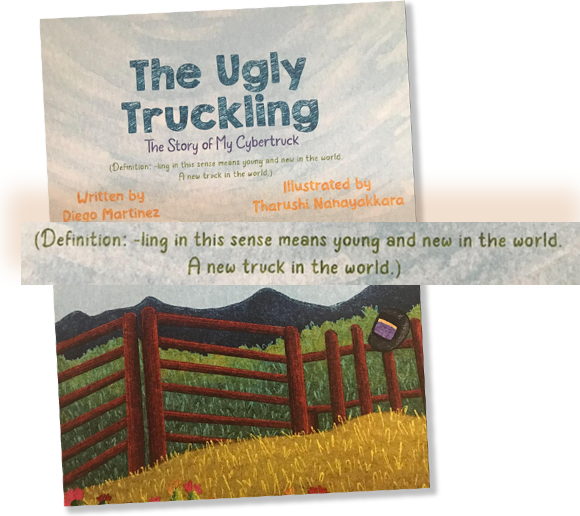
Sincerity time: this premise could’ve been an okay web cartoon, in the hands of a satirist. It also could’ve been written better in its sincere form. But no. Our universe’s eldritch Ideas-God placed this premise in the hands of Diego Martinez. I’m here to poop on Diego, but also feel grim sorrow for him. We’ll get to why I feel bad for him later.
For now, My Dear Hotdogger, consider what a children’s author should do with the premise of “Ugly Duckling Cybertruck”. If they do the sincere version of that premise, their Truckling should be a Truckling. The truck should be small. A baby truck. Like what I assume happens when Pixar’s Cars characters make a baby and it’s born baby-sized and it’s not grown up until Cars 7. That’s what a Truckling book should depict. Then the Truckling is the correct size for a child to befriend it. The Truckling can be their puppy. Then both the child and the Truckling get comfortable with their own flaws and foibles as they age into self-awareness.
Now let’s draft the satire. In that version of the idea, the baby Cybertruck grows up, and becomes a seven thousand pound monstrosity. The Truckling develops all the faults of a Cybertruck. A real Cybertruck is Cybertrickedout with faults. You depict its true status as an expensive, unsafe electric pickup. Then, at the end, it runs the kid over. Edgelord Jonathan Swift bit complete.
I don’t like either of those book ideas. Diego has an even worse third idea. He tells the story of a Tesla-pilled dad Tesla-pilling his regular child about a regular Cybertruck. I’m not adding that concept. It’s there from jump:
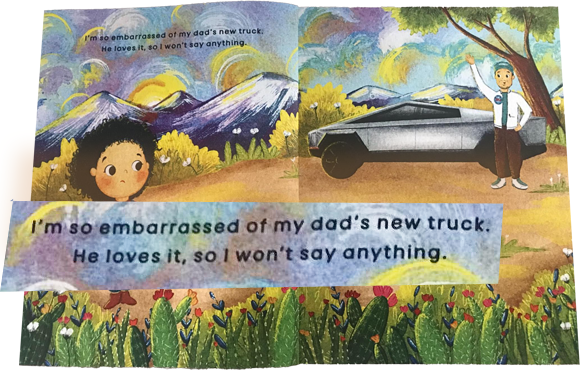
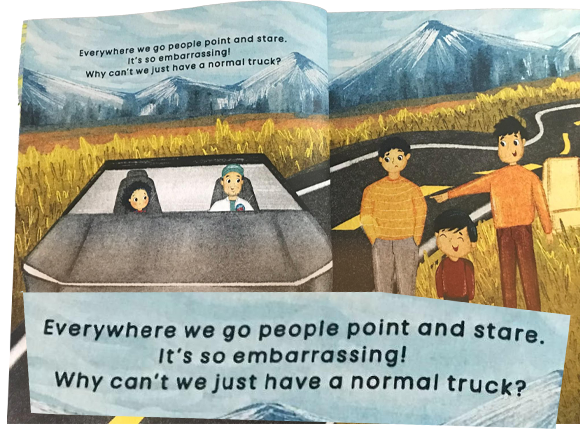
Are you aware of the genre of children’s entertainment that depicts flawed dads? There are many books, and entire Sesame Street storylines, for kids whose dads are divorced or jailed. That’s good! We’re overdue for that. But we needed one hundred further “troubled dad” books before we needed one book about CyberTruckJerkDads. I respect the complexity of divorce, and criminal justice, and owning any of the Teslas that debuted long before Elon Musk both mischaracterized and committed election fraud. If you bought a car-shaped Tesla a while ago, I get it.
I do not get Cybertruck buyer’s remorse. The Cybertruck is an innovative new idea, in the sense that Ford and GMC had that idea first but aren’t narcissists. The Cybertruck also debuted five years AFTER Elon Musk called a stranger a pedophile for fun. Every Cybertruck purchaser had enough alternatives and information to not buy a Cybertruck. They also have the option to roll up their windows and tune out the haters. You can own a Cybertruck. It’s fine. Your only punishment is some of us frowning about it. I know a set of rich Internet men believe that is “cancellation”. But you don’t need a Cybertruck AND universal adulation. And you don’t need to purchase a children’s book to read to yourself, to soothe yourself, while your child sits there like a prop. When you read this book at your child, you read about a dad lecturing at his child. Story Dad lectures Story Child about Elon Musk. Then the child likes Elon Musk and Cybertrucks and by extension their dad.
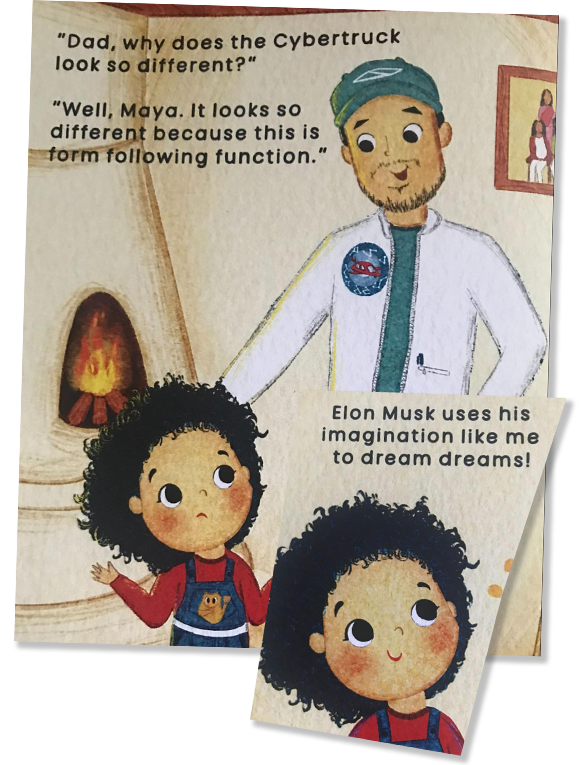
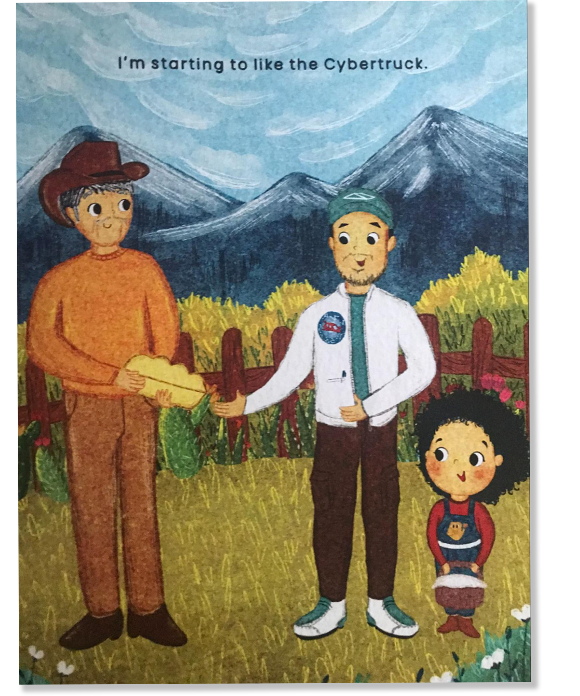
“Now read that page to me”, said too many childrens’ fathers. “Read. It. To. Me.”
Hey kids: have you heard of the most prominent character in this book? His name is Elon Musk, and he’s saving the environment.
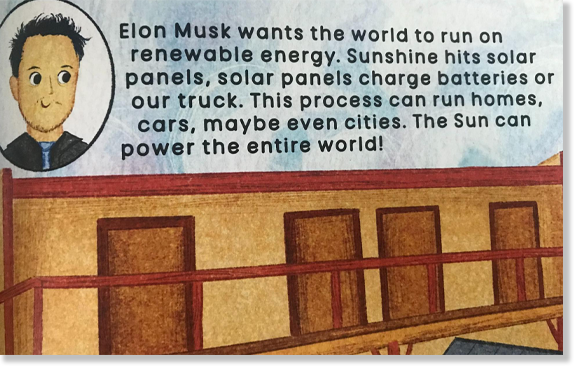
I’m conflicted about Elon Musk’s role in electric cars. Apparently most of his work at Tesla involved lowering safety standards and harassing/impregnating subordinates. Other people founded the company. Other people designed the cars. However, Elon Musk was an effective cheerleader and rodeo clown for the concept of electric cars. A well-written Ugly Truckling could celebrate that. Elorm helped the environment. However, fun fact, the main way to acquire this children’s book is to make Amazon Dot Com print it on demand. Amazon drop-shipped this to my door in less than 24 hours, and I am not an Amazon Prime member. Much like Kanye West cookbooks and creepy “captivating” histories, the final page of The Ugly Truckling bears the Amazon print-on-demand Mark Of The Beast.
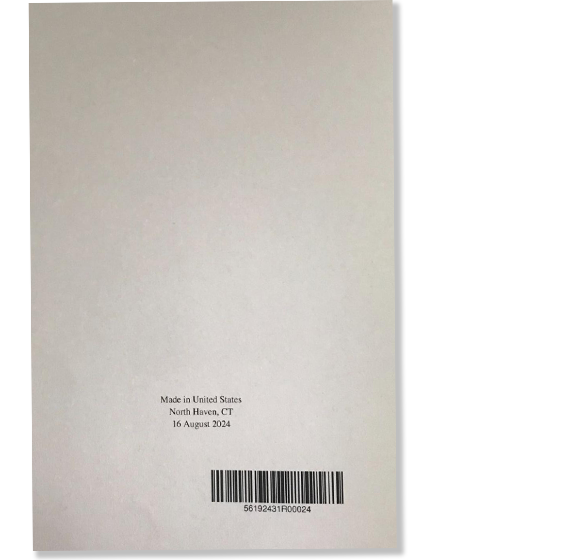
The book also has multiple extra blank pages before the last one, for no good reason. Turns out the Cybertruck fandom’s carbon footprint has an oscillating shoe size. Anyhow: The Ugly Truckling is an astounding achievement in Elon Musk Criticism. The Ugly Truckling is more devastating than every leftist, online, correct statement about Musk. It wrecks him because it doesn’t mean to. It’s written by a Musk fan. The Ugly Truckling opens with a lot of generic factoids about Cybertruck impressiveness. Did you know the Cybertruck is as powerful as 805 horses? It is! That’s almost as powerful as the good-looking Teslas!
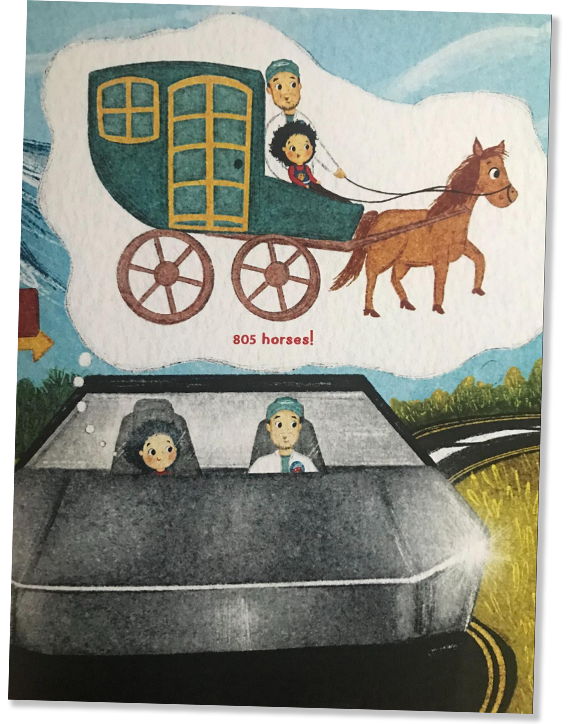
Then the book celebrates a key feature that sounds good, if you forget other humans exist. The Cybertruck features all kinds of features to keep you safe. You, individually, will be safe. Also you might not be safe if you drive the truck too fast, or shut any of the parts without tumbling clear of their blade-sides. But the Cybertruck is so safe from disasters. Disasters like blackouts, and floods, and other crises this book depicts just one child surviving while their community struggles. Readers see people’s food spoil and homes flood while the protagonist #cybers along. It’s like if the I Survived series covered our dystopian future. It’s like if the emperor Nero cybertrucked while Rome burned.
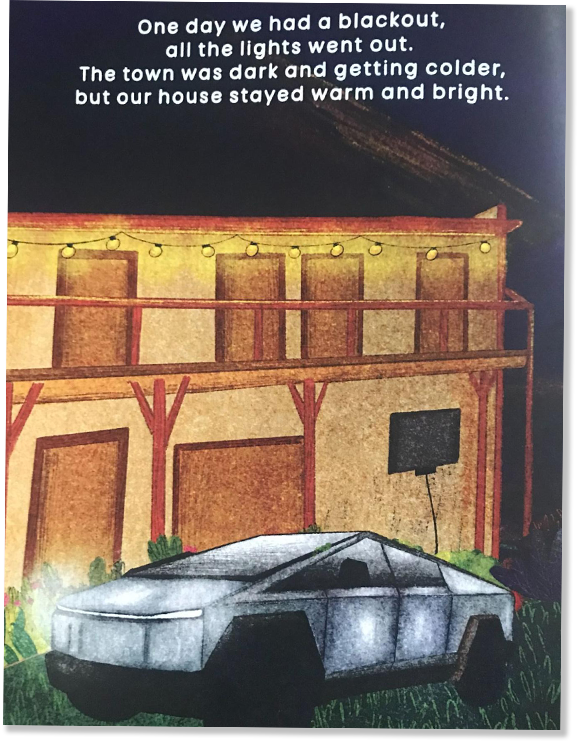
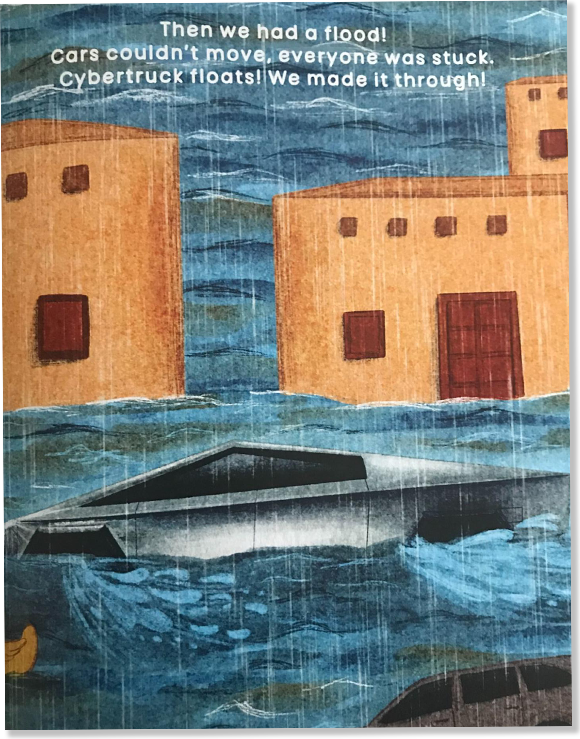
Also, did you know some people in the world have guns? Yes! Guns might seem like a romantic element of the Old West. But they’re still with us today. Good thing the Cybertruck protects you from that gun problem. A problem which there is no other way of addressing.
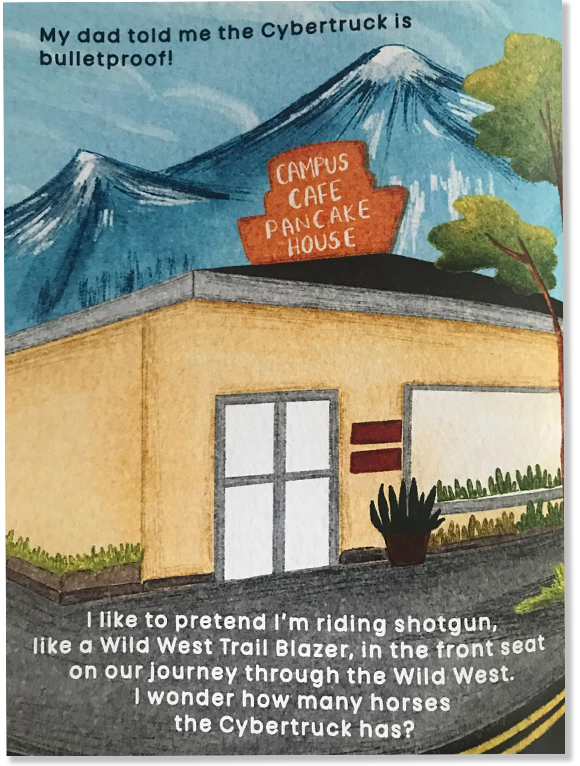
The Cybertruck also gets pitched as For Kids. The child and their peers hang out in it. After all, the Cybertruck has a screen and speakers. Much like most living rooms, or rooms you carry a laptop into. But hey, why not experience that in Cybertruck? Cybertruck! There’s truly no better childhood treehouse than a Cybertruck. Especially because the last good Tree Fort Tree got chopped down to print and package this book.

Other than this Emilio part, the story is didactic and flat, because that’s propaganda for you. Did you know a Cybertruck can power a tool for welding? Just like a generator? And/or an extension cord?
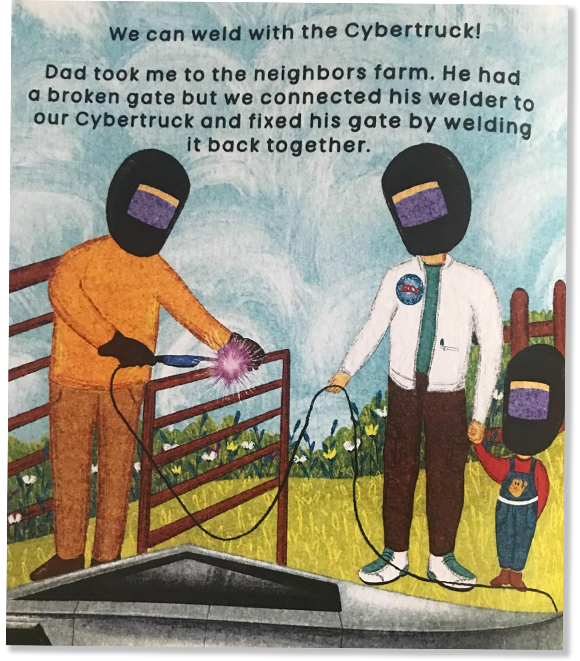
Entire pages get devoted to Consumer Reports-assed fantasies of owning the first-ever truck impervious to minor besmirching.
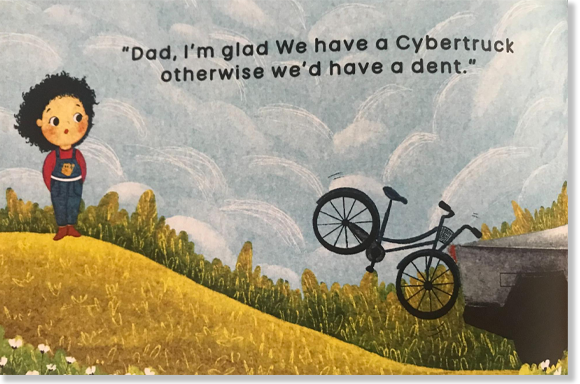
There’s also a big spread about the production reasons for the body of the truck being shaped that way. I did not know that stuff. It’s pretty much the pages you’d find in a good version of a Truckling book.
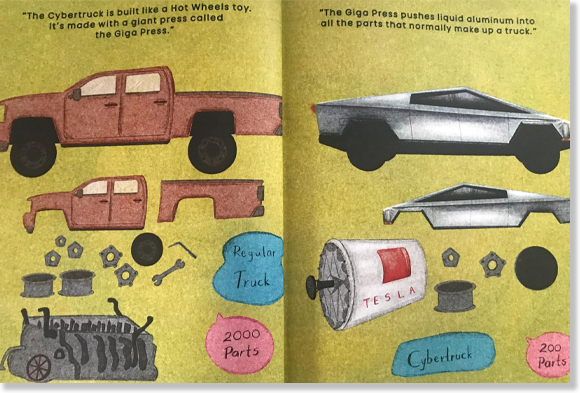
There’s one totally wild claim in this book. I’m convinced it’s a lie. But I’m open to the possibility that it’s depicting the personal experiences of the book’s author.
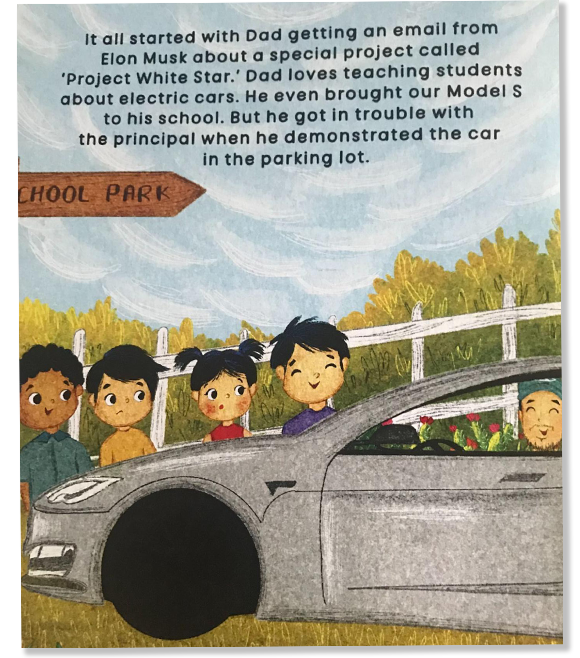
That’s an easy page to gloss over. But it’s depicting a schoolteacher getting in trouble for showing their students their Tesla. I could not find evidence of this ever happening. No teacher’s ever been disciplined for demonstrating a Cybertruck, or another “S3XY” Tesla model. Has that ever happened? If you can find evidence, please share it. I’ll badger Robert and Sean and we’ll update this bit. So far I can only find people feeling Musk-induced Tesla Remorse, for the real reasons and not for Cybertruck Body-Shaming.
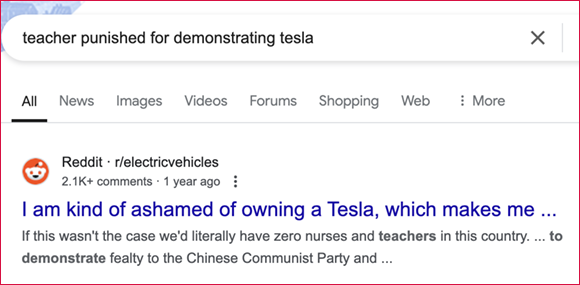
More refined googling led me to weirder stuff. There’s one truly wild story about a teacher facing criticism for Teaching Tesla. However, they did not teach about the car brand. Did you know there is a scientist with that same last name? He built stuff like coils. An Oregon teacher demo’d one such “Cybercoil” by firing it up in their classroom and zapping the words “I <3 Mom” onto students’ skin. The marks were temporary-ish. One kid’s skin had lingering redness and swelling. The teacher got in the newspaper for doing this, and for not facing any disciplinary action from the school, and for being arrested by police but then released without charges. The teacher also has One Of Those Faces. I do not say that cruel thing to be cruel. I say that to wonder how our flawed justice system did not jail him on a conviction for Worst-Degree Vibes, or execute him for Possession Of Cabin-Fella Stare.

I struggle to imagine there’s a world where a teacher gets CANCELLED for half-assing a Cybertruck parking lot “field trip”, yet this hard-to-justify Nikola Tesla lesson goes unpunished. But maybe the author is describing himself. Maybe he got punished or canned for walking his students into the parking lot, and toward the maw of his future truck. This brings us to the tragedy of The Ugly Truckling’s author. I did not try to contact or speak with Diego Martinez, because I am a coward. I did read his biography in the back of this book. His biography is positive.
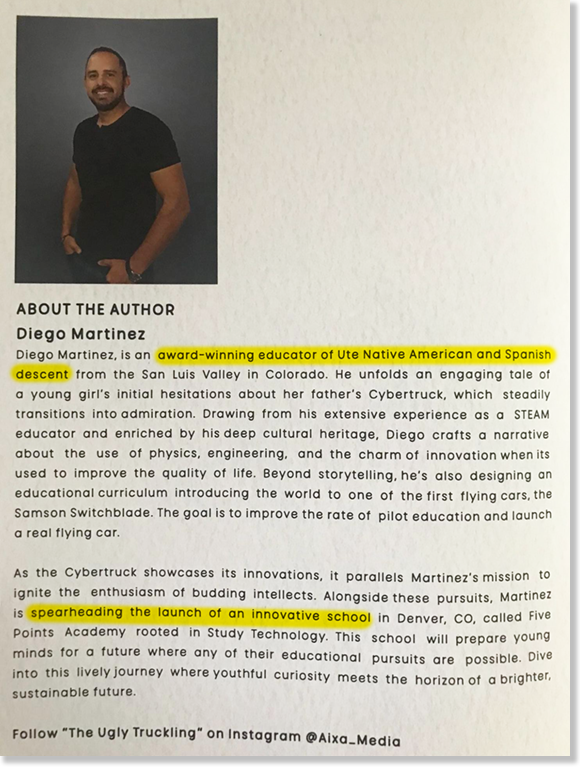
I also fact-checked that bio a little. The facts are true, and depressing. Diego Martinez founded a private middle school. It opened its doors as I type this. It has a professional website. It has 10 followers on Instagram. Based on every picture on both those webpages, I know Diego Martinez’s plan for launching a school. His plan was to purchase a Cybertruck, put stickers on that Cybertruck, and drive in circles until his community realized science is cool.


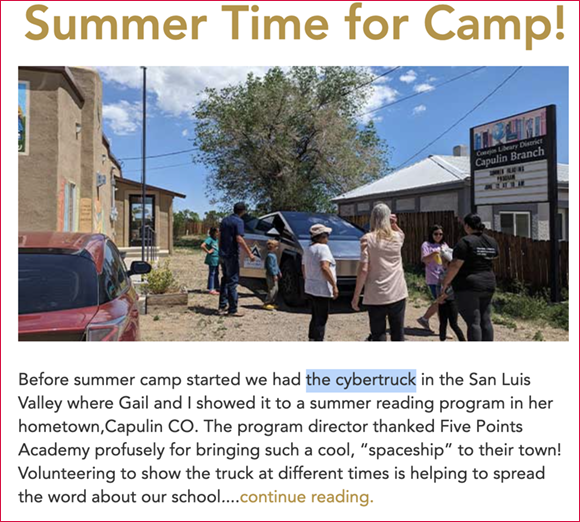
You and me are Internet users. We know there’s a Musk Cult out there, railing against Deep State Forces that are the Real Reason his website don’t work good. So it’s easy to forget about people who aren’t so online. Diego Martinez only seems to know Elon Musk is “the electric car guy.” Diego only knows “Cybertruck robot shape is the most Science.” That is a dangerously shallow understanding of Cybertrucks, placed in the hands of a dreamer. Diego Martinez heard about the Cybertruck. He got hyped up about it for earnest, child-like reasons. And when a little bit of backlash about the Cybertruck pierced his bubble, he did not ask where it came from. He drove 110 miles per hour toward a solution. He presumed the solution is a little bit of scicomm and a whole lot of love. That progression is why this book exists.
Imagine if those were your only thoughts about the robot shaped truck. If that is somehow all you knew, you could’ve written The Ugly Truckling. The book is a hopeful tribute to something poisoned by culture wars and bad men. I’ve been racking my brain for a parallel example. All I’ve got is a thought experiment. Think about the “Don’t Tread On Me” flag. Our militant sovereign citizens ruined that flag’s vibes long before J6 ruined it. If you did not know that stuff, you could spin a yarn about The Little Snake That Could. Or if you only knew scraps of the flag’s 1700s origins, you could doodle the tale of a Revolutionary War toddler who dyes cloth the exact shade of French’s brand mustard, despite his British Haters. Is that a nicer headspace to be in? Maybe that’s a joyous path to (wait for it) tread. Maybe it’s nice to not know anything beyond “snake cool!” and “truck cyber!” and “idea haver just likes Blade Runner a lot!” In that worldview, any dad who feels that same way is more nerdy than evil.
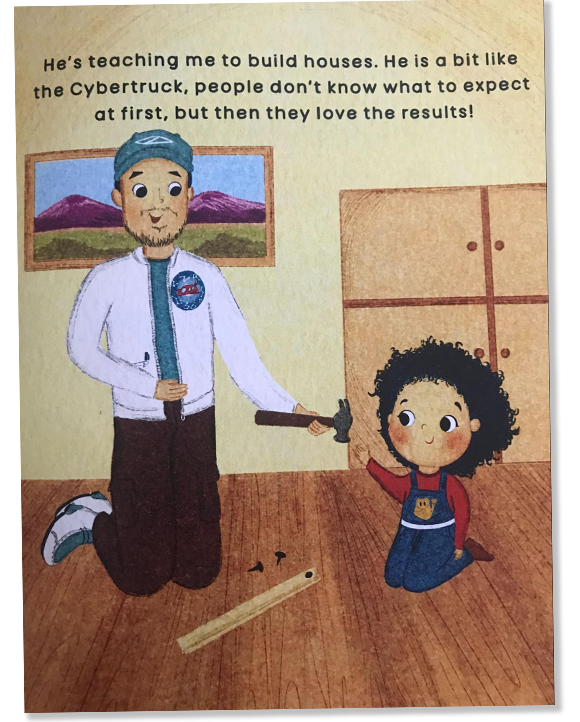
The dramatic irony here is cursed. I feel cursed emotions for the entire creative team of The Ugly Truckling. They stumbled into making an evil book for benign reasons. And I don’t know any more than the next fella about how we should lead our lives in this vale of tears. I just know Diego Martinez is sitting in the empty lobby of his STEM middle school waiting for kids to pour through the front doors. They’ll stream into his classrooms any second now. They’re about to do that. They’re probably not here yet because they’re running late. They’re late because their parents’ non-cyber trucks can’t drive fast. Yeah, that’s why. They’re on their way, he hopes. And when the hours tick by, and the real reason for their absence becomes clear, I don’t want that realization to crush Diego. When disappointment slices its Cybertruck’s Cybertrunklid through his Cyberknuckles, I hope Diego only loses his Cyberdigits, and retains his Cyberzest for life.

This article was brought to you by our fine sponsor and Hot Dog Supreme: Craig Lemoine, who is raising awareness for the non-profit group Divorced Assholes Devoid of Fundamental Understanding for Cybertruck Knowledge, Education, and Recognition.

